Shelf Life And Reader's Digest
 I just got an e-mail from Reader's Digest telling me that if I give them ten dollars, I can submit a poem and if I am deemed "the best", win $5oo bucks. Woohoo!
I just got an e-mail from Reader's Digest telling me that if I give them ten dollars, I can submit a poem and if I am deemed "the best", win $5oo bucks. Woohoo!
I'll be right on that.
I've had a funny relationshipship with poetry my adult life. Certain poets (Dylan Thomas, T.S. Eliot) have reached out and inserted themselves into my soft inner core where sappy songs and great lyrics and an occasional jingle fly around like cows in a tornado.
Get around a glib drunk in a bar who's lookin' to make a connection and let you know that you and he are "special" and not just simple folk caught up in the streaming maelstrom we all call LIFE, and I'll find myself reciting lines like --
...If there were water
And no rock
If there were rock
And also water
And water
A spring
A pool among the rock
If there were the sound of water only
Not the cicada
And dry grass singing
But sound of water over a rock
Where the hermit-thrush sings in the pine trees
Drip drop drip drop drop drop drop
But there is no water
Who is the third who walks always beside you?
When I count, there are only you and I together
But when I look ahead up the white road
There is always another one walking beside you
Gliding wrapt in a brown mantle, hooded
I do not know whether a man or a woman
—But who is that on the other side of you?
What is that sound high in the air
Murmur of maternal lamentation
Who are those hooded hordes swarming
Over endless plains, stumbling in cracked earth
Ringed by the flat horizon only
What is the city over the mountains
Cracks and reforms and bursts in the violet air
Falling towers
Jerusalem Athens Alexandria
Vienna London
Unreal...
This usually freaks them out. Their throat is now dry. They don't know who it is I am talking about. There is no water...
This is how I get a poetic drunk to buy me a beer.
The older I get, the more this other poem speaks to me. Well it doesn't really speak. More like a very familiar echo from within. I learned this poem when I was about fifteen. I love this poem--
LET us go then, you and I,
When the evening is spread out against the sky
Like a patient etherised upon a table;
Let us go, through certain half-deserted streets,
The muttering retreats
Of restless nights in one-night cheap hotels
And sawdust restaurants with oyster-shells:
Streets that follow like a tedious argument
Of insidious intent
To lead you to an overwhelming question …
Oh, do not ask, “What is it?”
Let us go and make our visit.
In the room the women come and go
Talking of Michelangelo.
The yellow fog that rubs its back upon the window-panes,
The yellow smoke that rubs its muzzle on the window-panes
Licked its tongue into the corners of the evening,
Lingered upon the pools that stand in drains,
Let fall upon its back the soot that falls from chimneys,
Slipped by the terrace, made a sudden leap,
And seeing that it was a soft October night,
Curled once about the house, and fell asleep.
And indeed there will be time
For the yellow smoke that slides along the street,
Rubbing its back upon the window-panes;
There will be time, there will be time
To prepare a face to meet the faces that you meet;
There will be time to murder and create,
And time for all the works and days of hands
That lift and drop a question on your plate;
Time for you and time for me,
And time yet for a hundred indecisions,
And for a hundred visions and revisions,
Before the taking of a toast and tea.
In the room the women come and go
Talking of Michelangelo.
And indeed there will be time
To wonder, “Do I dare?” and, “Do I dare?”
Time to turn back and descend the stair,
With a bald spot in the middle of my hair—
[They will say: “How his hair is growing thin!”]
My morning coat, my collar mounting firmly to the chin,
My necktie rich and modest, but asserted by a simple pin—
[They will say: “But how his arms and legs are thin!”]
Do I dare
Disturb the universe?
In a minute there is time
For decisions and revisions which a minute will reverse.
For I have known them all already, known them all:—
Have known the evenings, mornings, afternoons,
I have measured out my life with coffee spoons;
I know the voices dying with a dying fall
Beneath the music from a farther room.
So how should I presume?
And I have known the eyes already, known them all—
The eyes that fix you in a formulated phrase,
And when I am formulated, sprawling on a pin,
When I am pinned and wriggling on the wall,
Then how should I begin
To spit out all the butt-ends of my days and ways?
And how should I presume?
And I have known the arms already, known them all—
Arms that are braceleted and white and bare
[But in the lamplight, downed with light brown hair!]
It is perfume from a dress
That makes me so digress?
Arms that lie along a table, or wrap about a shawl.
And should I then presume?
And how should I begin? . . . . .
Shall I say, I have gone at dusk through narrow streets
And watched the smoke that rises from the pipes
Of lonely men in shirt-sleeves, leaning out of windows?…
I should have been a pair of ragged claws
Scuttling across the floors of silent seas. . . . . .
And the afternoon, the evening, sleeps so peacefully!
Smoothed by long fingers,
Asleep … tired … or it malingers,
Stretched on the floor, here beside you and me.
Should I, after tea and cakes and ices,
Have the strength to force the moment to its crisis?
But though I have wept and fasted, wept and prayed,
Though I have seen my head [grown slightly bald] brought in upon a platter,
I am no prophet—and here’s no great matter;
I have seen the moment of my greatness flicker,
And I have seen the eternal Footman hold my coat, and snicker,
And in short, I was afraid.
And would it have been worth it, after all,
After the cups, the marmalade, the tea,
Among the porcelain, among some talk of you and me,
Would it have been worth while,
To have bitten off the matter with a smile,
To have squeezed the universe into a ball
To roll it toward some overwhelming question,
To say: “I am Lazarus, come from the dead,
Come back to tell you all, I shall tell you all”—
If one, settling a pillow by her head,
Should say: “That is not what I meant at all.
That is not it, at all.”
And would it have been worth it, after all,
Would it have been worth while,
After the sunsets and the dooryards and the sprinkled streets,
After the novels, after the teacups, after the skirts that trail along the floor—
And this, and so much more?—
It is impossible to say just what I mean!
But as if a magic lantern threw the nerves in patterns on a screen:
Would it have been worth while
If one, settling a pillow or throwing off a shawl,
And turning toward the window, should say:
“That is not it at all,
That is not what I meant, at all.” . . . . .
No! I am not Prince Hamlet, nor was meant to be;
Am an attendant lord, one that will do
To swell a progress, start a scene or two,
Advise the prince; no doubt, an easy tool,
Deferential, glad to be of use,
Politic, cautious, and meticulous;
Full of high sentence, but a bit obtuse;
At times, indeed, almost ridiculous—
Almost, at times, the Fool.
I grow old … I grow old …
I shall wear the bottoms of my trousers rolled.
Shall I part my hair behind? Do I dare to eat a peach?
I shall wear white flannel trousers, and walk upon the beach.
I have heard the mermaids singing, each to each.
I do not think that they will sing to me.
I have seen them riding seaward on the waves
Combing the white hair of the waves blown back
When the wind blows the water white and black.
We have lingered in the chambers of the sea
By sea-girls wreathed with seaweed red and brown
Till human voices wake us, and we drown.
This poem will usually get an order of bangers and chips sent to our end of the bar. Sometimes... well, most times, I screw it up badly. It's long and hard to remember. Drunks don't usually notice. I learned it at fifteen mostly because a teacher of mine read it aloud to our class and the RYTHM of it just blew me away.
Later, while I was still young, I surmised that The Love Song of J. Alfred Prufrock was about having NO REGRETS. That's what I got out of it mostly. So I guess you could say this poem grabbed me as a sophomore in high school and sent me packing (literally). The idea of regreting life once you got to the other side of it just didn't sit well with me and the echoing of this poem inside the soft inner core of my being (where "It's the real thing, Coke is..." and other jingles also reside).
I mean, there was no way I was going to just get a job and have a normal go at life. Not with THAT running through my cranium.
The last of my favorite T.S. Eliot rifts was--
The eyes are not here
There are no eyes here
In this valley of dying stars
In this hollow valley
This broken jaw of our lost kingdoms
In this last of meeting places
We grope together
And avoid speech
Gathered on this beach of the tumid river
Sightless, unless
The eyes reappear
As the perpetual star
Multifoliate rose
Of death’s twilight kingdom
The hope only
Of empty men.
Here we go round the prickly pear
Prickly pear prickly pear
Here we go round the prickly pear
At five o’clock in the morning.
Between the ideaAnd the reality
Between the motion
And the act
Falls the Shadow
For Thine is the Kingdom
Between the conception
And the creation
Between the emotion
And the response
Falls the Shadow
Life is very long
Between the desire
And the spasm
Between the potency
And the existenceBetween the essence
And the descent
Falls the Shadow
For Thine is the Kingdom
For Thine is
Life is
For Thine is the
This is the way the world ends
This is the way the world ends
This is the way the world ends
Not with a bang but a whimper.
This one usually got the drunk to call out "check please" and grab his wrinkly old poet's hat and his jacket off the seat I'm leaning on...
He would stand and I would stand. We'd look into each other's eyes one last time...
And with a whimper the gentleman would stagger out of the bar and (hopefully) walk his way home.
I mention all of this because I got an e-mail from Reader's Digest wanting me to submit a poem and give them ten bucks. I ran through that soft inner part of my thoughts, riffling through such classics as "The quicker picker upper..." and "Gonna wash your troubles, down the drain..." and came up with a poem I had written once. The poem, ironically, is about the inhuman side of poetry. It was written about the time I actually stopped trying to write poetry (which is where this post was heading although you couldn't see it until I found it).
I don't try to write poetry because I don't get it anymore. Gone are the T.S. Eliots. Poetry is now a pile of words stacked on their heads. Things in the shape of poems are now qualifying as poetry. The RYTHM of a great poet is no longer. Nothing speaks to me like the drip drop drip drop of beautiful cadences... Poetry is taken over by hordes of bad poets.
I want my T.S.E...
Here is the last poem I tried to write. I have written others since, but they just showed up. I keep them in the same shopping bag I keep my old photos. Maybe I'll pull some out someday...
--Shelf Life--
There are too many words
On my shelves
To remember how
Your hands went cold
And you wanted to run.
Kundera tells me
"Life is Elsewhere"
And I believe him now
But I do not remember
The protagonist's name
Nor the storyline
Nor where I was
When he spoke to me.
Guilt lies hidden
As a word
Forever lost in romance
And tragedy
Mystery
And comedy.
What are vocabularies for?
These words
That masquerade as understanding?
What lives created
And set to live?
Ensconced in our own stories.
It's all in the heart, I've felt
Words don't say "I'm sorry".
And with that, I'll crumple up my hat and walk home, taking the twinkle in my eye for safe keeping.



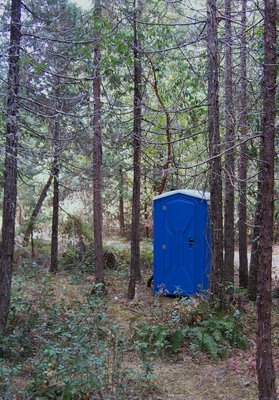


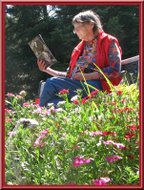
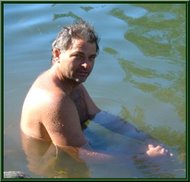
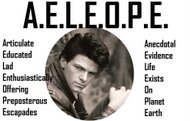

















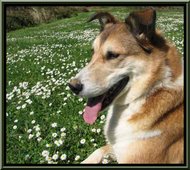

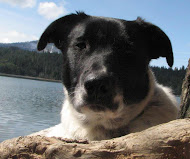



3 comments:
Good god I'd forgotten how great TSE is. It's strange, when I first learnt Prufrock I admired the style. Now I feel The sadness. AS your Blog asks for me to show you mine (and because no one ever knows it) here is my fav poem, the one I return to every so often just to centre myself:
Deep In my hidden country stands a peak
and none hath known its name
and none, save I, hath even skill to seek:
Thence my wild spirit came.
Tither I turr, when the day's garish world
too long hath vex'd my sight
and bare me limbs where the great winds are whirl'd
and lifes undreaded might.
For there I know the pools of clearest blue
glad wells of simple sooth,
there, steep'd in strength of glacier springs, renew
the lucid body of youth.
There I alone may know the joy of quest and keen delight off cold
or rest, what time the night with naked breast
and shaken hair of gold,
folds me so close, that her great breath would seem
to fill the darkling heart
with solemn certainty of ancient dream
or whispering to impart
aeonian life, larger than the seas of light
more limpid than the dawn:
there, when my foot hath toch'd the topmost height
the fire from heaven is drawn.
If any murmer that me 'sdainful hand withholds its sacrifice
where ranged unto the Law the peoples stand
Let this blown word suffice:
The gift of self is self's most sacred right:
only where none hath trod
only upon my secret starry height
I abdicate to God.
-Christopher Brennan.
Don't know how well it worls to get drinks out of drunks. You'll have to try it and tell me if it works :-D
Good god, tisty. Read that to me again with your accent! (I stuck an Assie accent on that and it worked wonders and went well with my morning coffee).
I shall returneth to it tonight when I am not heading off to go bang boards and sing to hippies who smell of sweat and Doug Fir boughs...
Thanks for sharing...
i like Shelley's "Ozymandias". We all crumble to dust in the end.Very cheerful."And I Tiresias have foresuffered all," to return to your poet of preference.
Post a Comment